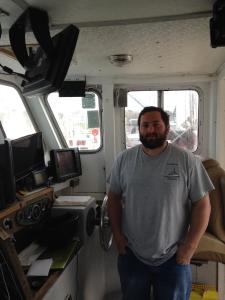Jared Bennett

Young Fishermen in the Northeast United States
Interviews with 39 fishers between the ages of 18-35, located along the US East Coast from Maine to North Carolina. Collectively, they represent a wide variety of gear types and fisheries. All had been fishing full-time for at least two years and wanted to make fishing their career. They describe motivations for choosing a fishing career, strategies used, barriers encountered, and facilitating factors that have enabled interviewees to defy the graying trend to become successful fishermen.
Please visit the Voices SoundCloud page to explore clips and stories that relate to this collection.
Sarah Schumann
Jared Bennett, 29 years old at the time of the interview, is owner-operator of the F/V White Cap, a gillnet vessel, with his younger brother and a friend, going on 36-hour fishing trips targeting monkfish, skates, and dogfish out of Chatham and Harwichport, MA. Jared bought his gillnet license and started fishing without any prior experience as a deckhand.
Scope and Content Note
In his interview, Jared talks about getting involved in the management of the groundfish sector, combatting the increasing costs of living on Cape Cod, and the difficulty of finding crew. Jared talks about how his interest in fishing was influenced by his background in boat building, but as his responsibilities grew, he began taking fishing more seriously as his primary source of income. Jared says that the expensive nature of the business, demanding lifestyle, high cost of living, housing prices, and limited dock space in Chatham contribute to the lack of young people in the industry. Despite these challenges, Jared says that he remains dedicated to his fishing career, adapting to industry dynamics. He mentions the overall fishing quota and the need to avoid exceeding it, particularly during wintertime when catching skates is limited to 500 pounds per trip. He highlights the sacrifices he has to make, such as missing out on summer activities, but also appreciates the flexibility and quality time he gets to spend with his daughter during the winter season. Jared discusses the financial aspects of his fishing business, including purchasing permits and financing his boat. He acknowledges the support he received from his father and the high costs involved in entering the fishing industry.
When asked about the future, Jared focuses on shorter-term plans, considering the potential impact of issues like wind farms and potential closures due to right whale protections on his fishing activities. He expresses his desire to continue fishing as long as he remains passionate about it. Jared emphasizes the aspects he loves about his career, such as being on the water, being his own boss, and providing fresh-caught fish to people. He advises young people interested in fishing to pursue it, recommending reputable boats to work on, and encourages aspiring boat owners to do their homework and start on a good boat.
Please Note: The oral histories in this collection are protected by copyright and have been created for educational, research and personal use as described by the Fair Use Doctrine in the U.S. Copyright law. Please reach out Voices@noaa.gov to let us know how these interviews are being used in your research, project, exhibit, etc. The Voices staff can help provide other useful resources related to your inquiry.
The NOAA mission is to understand and predict changes in climate, weather, oceans, and coasts, to share that knowledge and information with others, and to conserve and manage coastal and marine ecosystems and resources. The Voices Oral History Archives offers public access to a wide range of accounts, including historical materials that are products of their particular times, and may contain offensive language or negative stereotypes.
Voices Oral History Archives does not verify the accuracy of materials submitted to us. The opinions expressed in the interviews are those of the interviewee only. The interviews here have been made available to the public only after the interviewer has confirmed that they have obtained consent.
